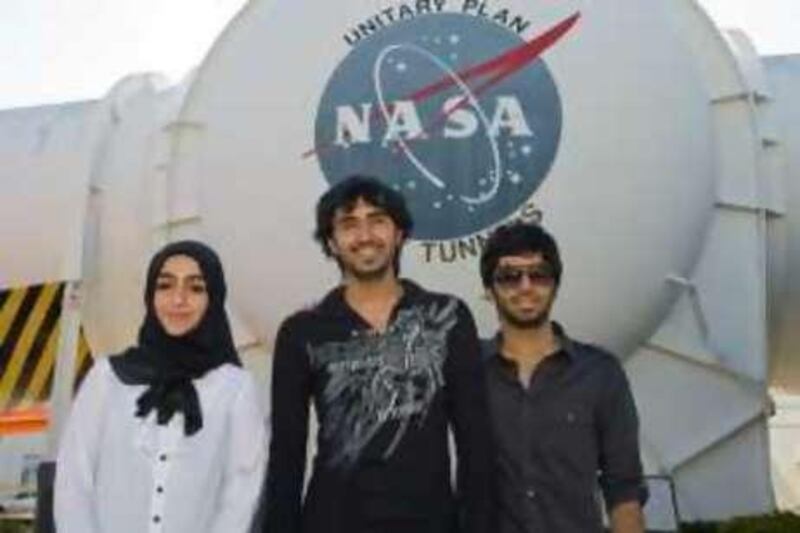Three Emiratis who are the first non-US citizens to train at the Nasa space agency said the intensive programme could be vitally important for the future scientific development of the UAE. "This is a one-of-a kind. It's a first step into something bigger," said Hazza Bani Malek, 20, speaking from the Ames Research Center in Silicon Valley, California.
Mr Bani Malek was selected along with his colleagues Hamad Rajab and Shamma al Qassim by the Arab Youth Venture Foundation, an organisation in RAK, to take part in the Educational Associates programme, which was previously reserved for US citizens. The programme is sponsored by Mubadala, the Abu Dhabi Government's strategic investment company. Nine more Emirati students are slated for training at Nasa this autumn.
Mr Rajab, 21, is an electrical engineering student at UAE University who is specialising in research into water-recycling systems that will be used in new Nasa spacecraft during the six week internship. He said he believes his project could have a direct impact on water-recycling technology in the UAE. "The UAE suffers a lack of water resources," he said. "Getting this technology back in our country will really contribute in saving the amount of money that is used."
Shamma al Qassim, 19, a computer engineering student at the American University of Sharjah, is working on a project to analyse satellite data that can help predict earthquakes. She said the Nasa programme, and others like them, are vital to developing the manpower necessary in advancing the country's science and technology sectors. "It is so important to get the proper training and experience," she said.
"Different countries have tried to introduce proper human resources training in technology and science. The UAE supports all these things in so many different ways -to give us opportunities." All three interns said their participation was particularly significant in view of the US President, Barrack Obama's recent advocation of increased collaboration with the Arab world in the realms of science and technology.
Mr Rajab said he would use the knowledge he has accrued on the programme to benefit his home country. "I want to develop my country. I want to be a decision maker. I would like to work in the Government or the private groups, he said. "I will definitely go back to the UAE and try to return some of the favours it did for me. I just want to utilize my knowledge and expertise." Mr Rajab said the selection process was rigourous.
"The day I received an e-mail that I had qualified, it was unbelievable - me being part of Nasa," he said. He said his and his co-trainees' high academic grades played a key part in their selection, while the range of extra-curricular programmes they had taken part in gave them the added edge. "The motivation and the interest and excitement of being involved in such programmes - going further in the knowledge to pursue our dreams - and achieving the vision and mission of the UAE: these are the main factors that qualify us to pass the difficult process," said Mr Rajab.
The students spoke of the sense of elation they first felt at the news that they had been selected for the prestigious programme. "When the articles [announcing the names of the students selected] came out, everybody was amazed,'" said Mr Bani Malek, a student at the Ras al Khaimah branch of the Higher Colleges of Technology, whose project with Nasa involves atmospheric analysis that can aid planetary entry.
"Everything happened so fast that I couldn't even tell everybody about it." Ms al Qassim said she was filled with a sense of awe as she arrived for her first day's training. "It wasn't like anything I've ever done, standing at the gate of Nasa, knowing I'll be working there," she said. She also paid tribute to the hospitality of the welcome they received from mentors and colleagues. "Every person that we've met, from the Nasa scientists to the organisers and other interns and students, has been unbelievably welcoming," said Ms al Qassim.
Mr Bani Malek said one invaluable byproduct of participating in the programme was the enhancement of cultural ties with the US. "Forget about the technical stuff, it's a great way to meet new people and tell them about our culture and exchange information and ideas," he said. @Email:kshaheen@thenational.ae * With additional reporting by Haneen Dajani







